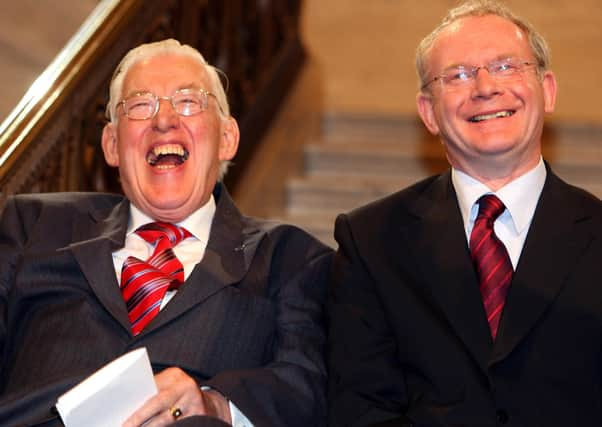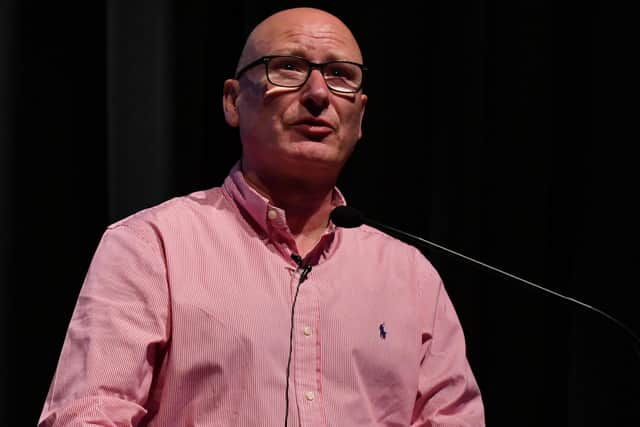Billy Hutchinson: The day I confronted Martin McGuiness over his new friendship with Ian Paisley


I was passionate about solving the issue of educational underachievement in the loyalist working class, but also more generally in Northern Irish society.
I was particularly drawn to the successful Scandinavian model regarding early years intervention. I felt that the Scandinavians were right; that 4-year-old kids shouldn’t be under pressure just to read and write, but should also be socialised and develop through play and interaction from an early age.
Advertisement
Hide AdAdvertisement
Hide AdThis was a model that I knew would work in my constituency. Even if the minister didn’t adopt it formally, surely he could find money from the departmental budget to run a pilot project and get an assessment of its success, or otherwise, in areas of socio-economic disadvantage like the Shankill. McGuinness flatly refused my request. I couldn’t help but take it personally.


I had a feeling deep in my gut that he wouldn’t adopt the idea because it was the PUP advocating for it – because it would help Protestants. If it had been suggested within Sinn Féin in relation to specific examples in Catholic working-class areas, I have no doubt he would have run with it immediately.
When it became clear in the chamber that this intransigence was going to stymie my suggestion, I raced to Martin’s Stormont office and entered without invitation. After his initial surprise, he became angry and asked some of his minders to remove me.
I held on to the chair I was sitting on, and they removed the chair with me on it into the corridor.
Advertisement
Hide AdAdvertisement
Hide AdA week after the UVF announced the end of its campaign, Ian Paisley met the Taoiseach Bertie Ahern on the site of the Battle of the Boyne. The previous month he had shaken Ahern’s hand outside Farmleigh House in Dublin.
It wasn’t the presence of Ahern that annoyed me, nor the fact that the DUP was sharing power with Sinn Féin; after all, it was necessary for the extremes to meet in the middle. Rather it was the hypocrisy of Paisley himself.
After all the thundering and bluster about the threat from the Irish Republic and the IRA, here he was doing everything he had criticised myself and other unionists and loyalists for doing for years before him. What was different now, I asked myself. Why had all those lives been lost in the years of the Troubles?
Around this time, I remember seeing a news item on the television about the Free Presbyterians and their discontentment with Paisley’s Damascene conversion.
Advertisement
Hide AdAdvertisement
Hide AdOne elderly lady, who had followed Paisley in his religious and political guises since the 1960s, was talking about how she felt utterly betrayed – how her whole worldview had been brought into question.
In the past I would have easily dismissed her as a relic and a bigot, but for some reason this lady’s dejection struck a nerve with me.
I didn’t agree with her religious or political convictions, but I could understand her sense of betrayal.
It must be a devastating experience to live your life by the ideals and doctrine of another person, with no room for individual thought or expression, only to then see that person do the opposite of almost everything they had preached to you about. It must have felt personal.
Advertisement
Hide AdAdvertisement
Hide AdShortly after all of this happened in Northern Ireland, I was invited out to Finland by the Finnish government to engage in a workshop with armed groups from Iraq and speak about universal issues such as radicalisation, disarmament, ceasefires and how to wind down a conflict.
I was at the airport waiting to embark on my flight to Helsinki, chatting to some Finnish diplomats, when I spotted Martin McGuinness along with Jeffrey Donaldson, who had defected from the UUP to the DUP in the early ’00s.
I had been to Finland before, and the diplomats were telling me that I was on the US government’s anti-terrorism list for speaking to these groups from Iraq.
I was brought across diplomatic lines and was able to get out to Finland to do the work I had been scheduled to do.
Advertisement
Hide AdAdvertisement
Hide AdAfter the first day of the workshop, I noticed that McGuinness was also staying in the hotel – but that he was part of a group of politicians from various places and we were being kept away from them.
The next morning, as usual, I went out early for a fifteen-mile run around a nearby forest. As I came back into the hotel, I heard a familiar voice; I knew the Derry accent straight away: ‘Billy, are you not going to say hello?’
I turned around and saw Martin McGuinness, now the deputy First Minister of Northern Ireland.
He had been out for a walk and was coming into the lobby behind me. ‘Alright, Martin. Where’s the other “chuckle brother”?
Advertisement
Hide AdAdvertisement
Hide Ad‘I thought you went everywhere together these days?’ McGuinness started to approach me, holding up his hands: ‘Look, Billy, Ian Paisley is the most misunderstood man in Irish history.’ I was shocked to hear McGuinness say this, and immediately hit back, ‘How dare you say that?’
He was obviously hoping to start a conversation about this: ‘Look, look, Billy.’ I started to walk off. ‘Don’t you dare tell me he was misunderstood. He was the biggest recruiting sergeant your guys ever had! The heartache and misery that Paisley caused in the loyalist community was massive.’
‘Let me explain, Billy,’ he replied. I walked a few steps back toward McGuinness and looked him straight in the face. ‘I don’t want to hear it! I don’t know what it would be like for Catholics, seeing you so cosy with Paisley, but I’ll tell you my point of view.
‘I had no time for the man, never did; but there were plenty of young fellas ended up in Long Kesh who would never have been there if it hadn’t been for Paisley’s sectarian rhetoric.’ I walked off before he could explain.
Advertisement
Hide AdAdvertisement
Hide AdPeople might ask was I not curious about what McGuinness was going to say to justify his new friendship with Paisley, but to be honest I wasn’t.
It was good that they were working together for a better Northern Ireland, but I didn’t want to hear soundbites to dress it all up. I’m not that sort of person.
If Paisley had given the same public support to some of the violent actions that he had advocated in private over the years, he would have been the UVF’s brigadier.
My Life In Loyalism by Billy Hutchinson is published by Merrion Press, available from Merrion Press, Waterstones, Easons, Amazon and online booksellers
A message from the Editor:
Advertisement
Hide AdAdvertisement
Hide AdThank you for reading this story on our website. While I have your attention, I also have an important request to make of you.
With the coronavirus lockdown having a major impact on many of our advertisers — and consequently the revenue we receive — we are more reliant than ever on you taking out a digital subscription.
Subscribe to newsletter.co.uk and enjoy unlimited access to the best Northern Ireland and UK news and information online and on our app. With a digital subscription, you can read more than 5 articles, see fewer ads, enjoy faster load times, and get access to exclusive newsletters and content. Visit https://www.newsletter.co.uk/subscriptions now to sign up.
Our journalism costs money and we rely on advertising, print and digital revenues to help to support them. By supporting us, we are able to support you in providing trusted, fact-checked content for this website.
Alistair Bushe
Editor